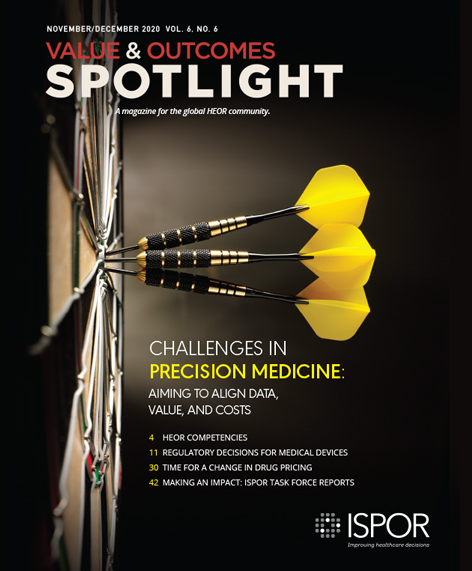The ISPOR HEOR Competency Framework
Jim Murray, PhD and Laura T. Pizzi, PharmD, MPH
Health economics and outcomes research (HEOR) has expanded globally, fueling demand for professionals trained in the discipline. This has different implications for the diverse ISPOR membership; life science companies need to find and recruit talent with the right training and experience, while students and faculty need to understand what skills companies seek to be able to tailor their educational pursuits to meet this demand. These needs, among others, gave rise to the ISPOR Competency project, which has established a set of competencies for HEOR professionals. The 41 competencies are organized into 13 topic domains (Table 1) that collectively comprise the ISPOR Health Economics and Outcomes Research Competencies Framework™, which was recently published in Value in Health.1 The Framework represents an important accomplishment for ISPOR and for our discipline as a whole.
Table. The ISPOR Health Economics and Outcomes Research Competencies Framework™

The Framework is a product of collaboration between the ISPOR Institutional and Faculty Advisor Councils, which developed an initial list of competencies that were then validated by 3 independent assessments. First, we used a natural language analysis to examine overlap between the competencies included in ISPOR Career Center HEOR job postings and to identify missing competencies. Next, we obtained qualitative input from a focused Institutional Council–Faculty Advisor Council reactor panel. The final step was a set of surveys collected from faculty members, student members, and ISPOR membership at large (which we refer to as the “general membership”).
The surveys yielded rich results. The general ISPOR membership survey revealed the importance of each competency to the HEOR discipline as well as the relevance of each competency to the job held by the respondent. All competencies (except Pharmacovigilance Analysis) were rated as important or critically important by a significant majority of respondents. We retained this competency, although it’s not core to HEOR, and anticipate that future work will elucidate whether it should be retained in the Framework."The Framework is a product of collaboration between the ISPOR Institutional and Faculty Advisor Councils, which developed an initial list of competencies that were then validated by 3 independent assessments. "
General membership survey results also indicated that respondents felt all competencies were relevant to their jobs, except Pharmacovigilance Analysis and Career Development – Academia, which may not have been sufficiently represented by the job types held by respondents. In addition, from the general membership survey, we found that 7 specific HEOR specialty tracks covered 80% of the respondents. These were:
• HEOR Generalist (health economics and health outcomes research)
• Health Economist
• HEOR Management or Administration
• Health Technology Assessment
• Real-World Evidence and Observational Study Specialist
• Patient-Reported Outcome/Clinical Outcomes Assessment
• Pricing, Access, and Reimbursement
As expected, we found the relevance of competencies to differ based on specialty track.
The faculty member survey assessed the extent to which their university’s HEOR graduate degree programs covered each of the competencies. The faculty results were then compared to the student member survey that assessed students’ exposure to each of the competencies in their HEOR academic program. There was strong agreement between the students’ exposure to the competencies and the degree to which they were covered in the academic programs we surveyed.
After completing the surveys, we aligned the resulting competencies and domains with a taxonomy of education topics created by the ISPOR Education Council. The objectives of this task were to: 1) ensure that ISPOR short courses can be mapped into the ISPOR Competency domains, and 2) facilitate the ability of short-course participants to map their learnings to the competencies.
Now that the Framework has been established, we have received tremendous interest in using it as a tool to inform both individuals and organizations interested in gaining or assessing HEOR competencies. The ISPOR Student Network has used it to identify webinar topics to present to membership worldwide; New Professionals are using it to understand what competencies are covered by HEOR fellowships; institutional members are using it to identify what competencies they seek in company hires; faculty are using it to assess what competencies their programs cover and/or what niche their program has; and complementary disciplines, such as medical affairs, have taken interest in understanding what HEOR competencies apply to professionals in their discipline.
As interest takes hold, we have embarked on the key next steps towards refining the Framework. This entails dissecting the broadest competencies into detailed topics—starting with competency 10.1 Statistics and Analytics. As a cornerstone of HEOR, this particular competency certainly requires greater specificity to be most useful. The effort is being led by Ebere Onukwugha, PhD, and involves assessment of methodological writings, reports, and training programs related to HEOR analytics and engagement of ISPOR experts on the topic. Ongoing work also involves identifying permutations of the Framework that are specific to each HEOR specialty track. Indeed, we see the ISPOR Competency Framework as a dynamic entity that should evolve with the HEOR discipline.
ISPOR member input has been instrumental to this initiative and will continue to play a critical role moving forward. Feel free to provide your suggestions and ideas by contacting us via email at murray_james@lilly.com or laura.pizzi@rutgers.edu. •
Reference
1. Pizzi LT, Onukwugha E, Corey R, Albarmawi H, Murray J. Competencies for professionals in health economics and outcomes research: The ISPOR Health Economics and Outcomes Research Competencies Framework. Value Health. 2020;23(9):1120-1127.
Table 1. The ISPOR Health Economics and Outcomes Research Competencies Framework™

